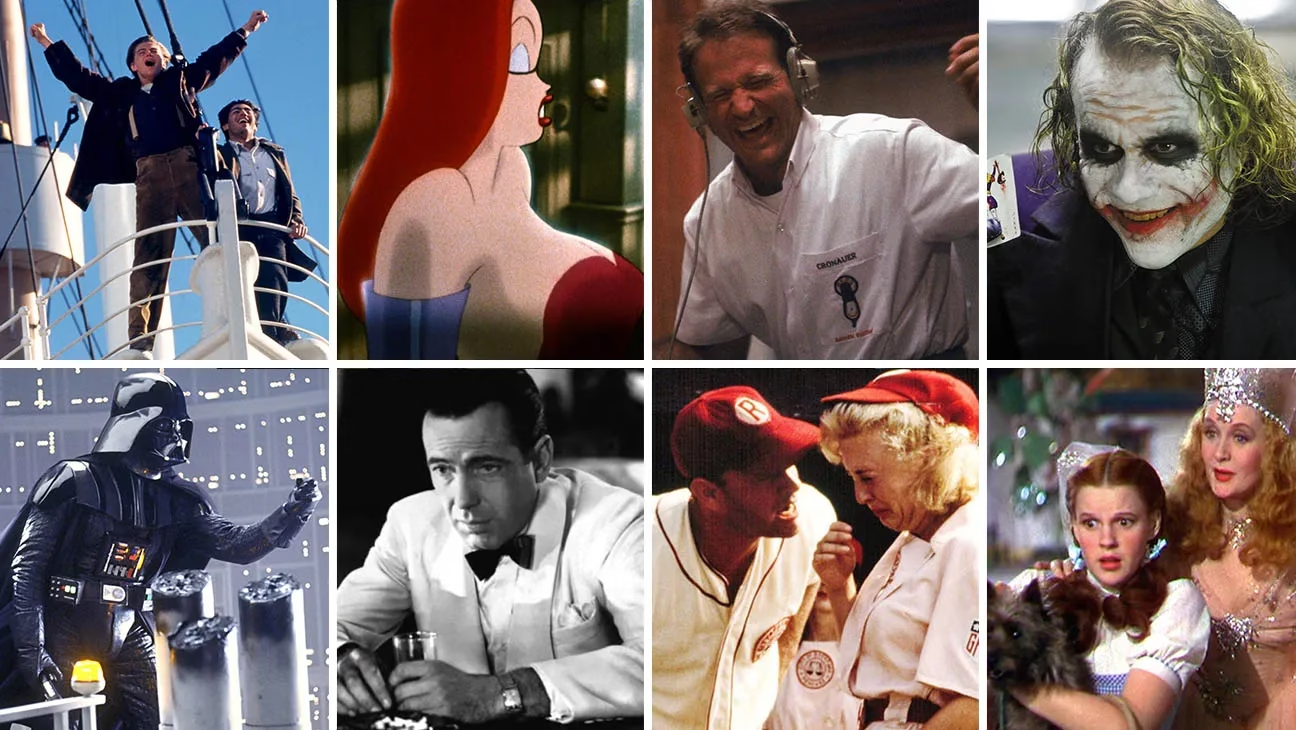“Here’s looking at you, kid.”
“May the Force be with you.”
“You can’t handle the truth!”
“You’re gonna need a bigger boat.”
These lines are more than just dialogue; they are cultural touchstones, woven into the very fabric of our collective consciousness. Decades after their films were released, they are still recited in conversations, used as social media captions, printed on t-shirts, and shouted across crowded rooms. They have achieved a rare form of pop culture immortality.
But why? In a world saturated with content, where thousands of films are released every year, what is the secret sauce that allows a select few lines of script to transcend their origin and live on forever?
The answer lies at the intersection of psychology, linguistics, storytelling, and pure cultural luck. It’s not an accident. It’s a recipe. Let’s pull back the curtain and explore the fascinating reasons why some movie quotes never die.
Part 1: The Psychological Hook: How Our Brains latch Onto Iconic Lines
1. The Power of Relatability: The “You Too?” Phenomenon
At their core, the most enduring movie quotes often articulate a universal human experience with stunning simplicity and accuracy. They give voice to a feeling we’ve all had but could never quite articulate.
- Example: “You had me at ‘hello.'” (Jerry Maguire). This line perfectly captures the moment when logic and argument fall away, and pure, simple love takes over. It’s a feeling anyone who has ever been in love can instantly connect with.
- Example: “Life is like a box of chocolates; you never know what you’re gonna get.” (Forrest Gump). This is a profound, yet simple, metaphor for the unpredictability of life that resonates across ages and cultures.
When a character expresses something we deeply feel, the line sticks because it feels true. It creates a powerful “you too?” moment between the audience and the screen, forging a personal connection that outlasts the film’s runtime.
2. The Rule of Threes and Rhythmic Satisfaction
Our brains are hardwired to find patterns pleasing and memorable. The “rule of three” is a classic principle in writing and rhetoric that suggests things that come in threes are inherently more satisfying, effective, and memorable.
- Example: “The first rule of Fight Club is: you do not talk about Fight Club. The second rule of Fight Club is: you do not talk about Fight Club.” (Fight Club). The repetition and the structure make it punchy and unforgettable.
- Example: “You’re gonna need a bigger boat.” (Jaws). While not a classic three-part list, its rhythm is perfect. It’s a simple, declarative sentence with a clear and escalating stakes.
Lines with a certain musicality, alliteration, or rhythmic cadence are simply easier for our brains to encode and recall. They feel good to say.
3. High-Context Emotional Anchoring
Memory is highly state-dependent and linked to emotion. The most memorable quotes are often delivered at the absolute peak of a film’s emotional arc. Our brains don’t just remember the line; they remember the feeling we had when we heard it.
- Example: “As you wish.” (The Princess Bride). This line is not inherently poetic. Its power comes from its context. We learn, along with Buttercup, that it was never just a command; it was Westley’s way of saying “I love you.” The line becomes a vessel for the entire film’s theme of true love.
- Example: “It’s not your fault.” (Good Will Hunting). Repeated by Sean Maguire (Robin Williams) to Will Hunting (Matt Damon), this line is the emotional climax of the entire film. The audience feels the weight of Will’s lifelong trauma being slowly lifted. The quote is powerful because it’s attached to one of the most cathartic scenes in modern cinema.
The brain anchors the words to the intense emotional experience, making the quote incredibly durable.
Part 2: The Cultural Engine: How Quotes Spread and Endure
4. Utilitarian Value: The Quote as a Social Tool
Some quotes survive not just because they are profound, but because they are useful. They become social shorthand, a quick and clever way to express a complex idea or reaction in everyday life.
- Example: “You can’t handle the truth!” (A Few Good Men). This is the perfect retort in any situation where someone is avoiding a harsh reality, from a workplace dispute to a silly argument with a friend.
- Example: “I’m gonna make him an offer he can’t refuse.” (The Godfather). It’s instantly understood as a statement of immense power, control, and implied threat, used jokingly in negotiations for everything from a business deal to who gets the last slice of pizza.
- Example: “I’ll be back.” (The Terminator). The ultimate declaration of return, used in countless contexts from leaving a room to promising to revisit a task.
These quotes are linguistic Lego bricks. They slot perfectly into our daily interactions, ensuring they are practiced and repeated, keeping them alive.
5. The Meme Before Memes: Quotability as a Virus
Long before the internet, iconic movie quotes spread through a cultural osmosis that functioned like a biological meme (a term coined by Richard Dawkins for an idea that replicates). A truly quotable line has the key features of a successful virus:
- Fidelity: It’s short and precise, so it’s replicated accurately (“Here’s Johnny!”).
- Fecundity: It’s used in a highly memorable scene, so it’s replicated often.
- Longevity: It has a long “shelf life” because it remains relevant.
In the modern era, the internet has supercharged this process. GIFs, reaction videos, and social media posts act as vectors, spreading these quotes to new audiences at lightning speed. A quote from a 40-year-old film can be introduced to a teenager today through a single viral TikTok.
6. The Star Power and Delivery Factor
The actor delivering the line is not incidental; it’s instrumental. The same words spoken by a different performer could fall flat. The charisma, timing, and unique vocal quality of a star can elevate a good line into a legendary one.
- Example: “You talkin’ to me?” (Taxi Driver). The script simply said “Travis speaks to himself in the mirror.” It was Robert De Niro’s improvisational genius, his slurred, psychotic delivery, that made the line iconic.
- Example: “Why so serious?” (The Dark Knight). Heath Ledger’s chilling, lip-smacking, unhinged performance as the Joker imbues this simple question with terrifying menace.
- Example: “I drink your milkshake!” (There Will Be Blood). The line itself is bizarre, but Daniel Day-Lewis’s venomous, roaring delivery makes it a terrifying metaphor for capitalist greed that is impossible to forget.
The performance is the lightning in the bottle. It fuses the words to a specific, unforgettable persona.
Part 3: The Anatomy of an Immortal Quote: A Breakdown
Let’s dissect a perfect specimen to see these principles in action: “Here’s looking at you, kid.” from Casablanca (1942).
- Psychological Relatability: It’s a toast, a farewell, and an expression of deep, resigned love all at once. It captures the bittersweet pain of a love that must be let go for a greater good—a profoundly relatable, if tragic, emotion.
- Emotional Anchoring: It’s delivered at the most emotionally charged moment of the film. Rick (Humphrey Bogart) is sacrificing his own happiness for Ilsa’s (Ingrid Bergman). The line is the emotional core of their entire relationship, making it incredibly potent.
- Star Power & Delivery: Humphrey Bogart’s delivery is perfect. It’s not overly sentimental; it’s wistful, rugged, and cool. His persona makes the romantic line feel earned and masculine, preventing it from becoming saccharine.
- Cultural Utility & Mystique: It’s a sophisticated, classic way to offer a toast. Its slightly old-fashioned phrasing gives it a timeless, classy quality. It’s also used multiple times in the film, creating a callback that reinforces its importance.
This multi-layered perfection is why, 80 years later, the line still has power.
Part 4: The Modern Quote-Making Machine (And Why It Often Fails)
Today, studios are acutely aware of the cultural and marketing value of an iconic quote. Trailers often seem to try and force a “quote moment,” highlighting a specific line to signal its importance. But this often backfires.
The “Forced Quotable” vs. The “Earned Quotable”
- Forced Quotable: A line that feels focus-grouped and placed specifically to become a meme. It often feels disconnected from the scene’s organic emotion and tries too hard to be clever or badass. (e.g., many lines in later Transformers films or other studio-driven blockbusters).
- Earned Quotable: A line that emerges naturally from the character’s journey and the scene’s emotional truth. Its power is a byproduct of great storytelling, not its primary goal. (e.g., “With great power comes great responsibility” from Spider-Man).
Audiences are savvy. They can sense when a line is trying to manipulate them into remembering it, and they often reject it. True immortality cannot be manufactured; it must be earned.
Part 5: Quotes That Defy the Rules: The Weird and Wonderful
Sometimes, a quote’s longevity is a mystery. It doesn’t fit the mold but survives through sheer absurdity or cultural whimsy.
- Example: “You’re a wizard, Harry.” (Harry Potter and the Philosopher’s Stone). The line itself is simple exposition. Its power comes from the monumental shift it represents for the character and the audience—the entry point into a magical world.
- Example: “I am Groot.” (Guardians of the Galaxy). The genius here is that the meaning is entirely dependent on Vin Diesel’s delivery and the context. The line itself is meaningless, but we feel its meaning—fury, sadness, joy, friendship. Its memorability comes from its unique, repetitive, and emotionally versatile nature.
These outliers prove that while there is a recipe for an immortal quote, there’s always room for a little magic.
Part 6: The Legacy: What Immortal Quotes Tell Us About Ourselves
The movie quotes that never die form a mosaic of our collective values, fears, and desires. They are a time capsule of what we find funny, what we find profound, and what we aspire to be.
- They reflect our yearning for heroism (“I am your father.”).
- They reveal our shared sense of humor (“So you’re telling me there’s a chance?”).
- They articulate our deepest philosophical questions (“What is the matrix?”).
When we repeat these lines, we are not just referencing a movie. We are participating in a shared cultural ritual. We are signaling our membership in a tribe that understands the reference, that shares the feeling. We are, in a small way, keeping a piece of shared storytelling alive.
Conclusion: The Unwritten Formula for Eternity
So, why do some movie quotes never die? It’s a powerful, yet elusive, alchemy.
They are born from universal truth, delivered with unforgettable performance at a moment of peak emotion. They are crafted with a memorable rhythm and gain immortality by becoming useful tools in our daily lives, spreading through culture like a benevolent virus.
They are the lines that give us chills, make us laugh, or help us make sense of the world. They are the ghosts of stories we love, lingering in our minds and on our lips long after the credits have rolled. They are proof that in the right hands, with the right words, at the right time, a piece of cinema can truly live forever.
What’s your all-time favorite immortal movie quote, and why do you think it has endured? Share your thoughts in the comments below—let’s see which lines have truly stood the test of time!

